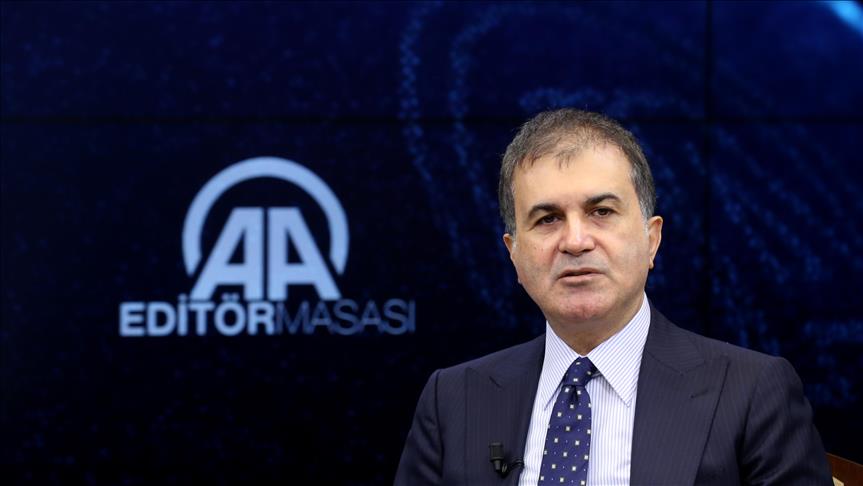
ANKARA
A decision to cut or pause negotiations on Turkey’s EU accession process would be “suicide” for the bloc, EU Affairs Minister Omer Celik said on Wednesday.
Speaking at Anadolu Agency’s Editors’ Desk in capital Ankara, Celik said: “If the only decision taken by the European bloc, which cannot even solve its own problems, would be to cut or pause negotiations with Turkey, it will be suicide.”
His statement came days after German Chancellor Angela Merkel asked her fellow leaders to cut Instrument for Pre-Accession Assistance (IPA) for Turkey.
However, to stop such payments would require a joint decision by EU member states to freeze or stop accession talks with Ankara.
“Talking about cutting pre-accession assistance decreases the EU's credibility,” Celik said.
He said the decision to cut monetary assistance “does not mean anything” to Turkey. “They are talking about cutting or reducing IPA aid. That does not mean anything. This is something which decreases the EU's credibility”.
Turkey is expected to receive €4.45 billion ($5.23 billion) from the EU in pre-accession funding in the 2014-2020 period. However, so far both sides have signed deals worth €1.78 billion ($20.9 billion), according to Celik.
Moreover, Germany, Austria and the Netherlands have also seen a rise in anti-Turkey rhetoric during national elections in recent months.
Austria's 'psychiatric obsession'
About Austria's anti-Turkey stance, Celik said: "Austria's obsession with Turkey has become a psychiatric obsession.”
Celik said those who spoke out against Turkey’s EU membership bid actually did “great damage to the EU’s credibility”.
He said the far-right was gaining across Europe and the bloc had failed to stop it.
The minister said if the EU does not overcome the crisis, complete its reform process and fulfill its promises, there would be no attraction for Turkey to join it.
He said the EU should take decisions according to its principles rather than “acting on the notion of horizontal solidarity.
"If you are going to act on the notion of horizontal solidarity rather than following principles, then it is the United States of Europe, not the EU anyway."
Turkey applied for membership in the European Economic Community (a precursor to the EU) in 1987. It became eligible for EU membership in 1997 and accession talks began in 2005.
To gain membership, Turkey has to successfully conclude negotiations with the EU in 35 policy chapters that involve reforms and the adoption of European standards.
Meeting with Berger
Pointing out that Turkey's strong growth rate was above the EU average, Celik said his country had reached its economic strength without membership in the bloc.
“Turkey can continue its path towards EU membership with its sound stance on democracy,” he said, adding that the membership would be benefited for both sides.
The minister also touched upon the Turkey-EU refugee deal reached in March 2016, which aimed to discourage irregular migration to Europe through the Aegean Sea.
The deal included a €6 billion ($6.8 billion) aid package to help Turkey care for millions of refugees hosted in the country. However, Turkey has so far received only €677 million ($716 million). The agreement also allowed for the acceleration of Turkey’s EU membership bid and visa-free travel for Turkish nationals within the Schengen area that comprises most EU states.
Celik said Ankara had fulfilled its part of the agreement by stopping refugee influx while the EU did not keep its promises.
Later, the minister received the head of the EU Delegation to Turkey, Ambassador Christian Berger, to discuss issues regarding Turkey in EU leaders’ meeting in Brussels.
"The approaches to cut or suspend negotiations with Turkey did not find support at EU summit," Celik said after his meeting with the EU Turkey delegation chief.
Berger, for his part, underlined the importance of the meeting with Celik, saying it was good to discuss how we could advance the efforts between EU and Turkey on EU membership.
Reporting by Tugrul Cam, Nazli Yuzbasioglu








